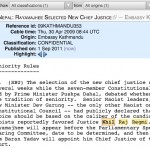विकिलिक्समा खिलराज रेग्मी
 अन्तरिम चुनावी मन्त्रिपरिषद्का अध्यक्षका रुपमा प्रधान न्यायाधीशसमेत रहेका खिलराज रेग्मीले शपथ लिएर पदबहाली गरिरहँदा अमेरिकी दूतावासको वक्तव्य आइसकेको थियो। छिमेकी देशहरु भारत, चीन र युरोपेली देशहरुले भन्दा छिटो अमेरिकाले स्वागत गर्न हतार गर्यो। त्यसैले सबैभन्दा पहिले स्वागत वक्तव्य निकाल्ने अमेरिका नै भयो। संयोग के परेको छ भने यही अमेरिकी दूतावासले नै
अन्तरिम चुनावी मन्त्रिपरिषद्का अध्यक्षका रुपमा प्रधान न्यायाधीशसमेत रहेका खिलराज रेग्मीले शपथ लिएर पदबहाली गरिरहँदा अमेरिकी दूतावासको वक्तव्य आइसकेको थियो। छिमेकी देशहरु भारत, चीन र युरोपेली देशहरुले भन्दा छिटो अमेरिकाले स्वागत गर्न हतार गर्यो। त्यसैले सबैभन्दा पहिले स्वागत वक्तव्य निकाल्ने अमेरिका नै भयो। संयोग के परेको छ भने यही अमेरिकी दूतावासले नै
३० अप्रिल २००९ मा सो केबल पठाउँदा देशमा पुष्पकमल दाहाल ‘प्रचण्ड’ प्रधानमन्त्री थिए। त्यतिबेला केदारप्रसाद गिरीले अवकाश पाउन लागेकाले नयाँ प्रधान न्यायाधीशको खोजी हुँदै थियो। माओवादीले वरिष्ठताका आधारमा नभई कार्यक्षमताका आधारमा गर्न प्रधान न्यायाधीश बनाउनु पर्ने बहस थालेको थियो। तत्कालीन कानुन मन्त्री तथा अहिले वैद्य माओवादीमा रहेका देव गुरुङले सार्वजनिक रुपमै वरिष्ठताका आधारमा नभई क्षमताका आधारमा प्रधान न्यायाधीश नियुक्त गरिने बताएका थिए। न्याय परिषद्को एउटा बैठकमा तत्कालीन अध्यक्ष तथा प्रम प्रचण्ड र कानुन मन्त्रीले रेग्मीको नामसमेत प्रस्ताव गरेका थिए जसलाई अरुले मानेनन्। अन्त्यमा परम्परा तोडिएन र वरिष्ठताका आधारमा मिनबहादुर रायमाझी नै प्रधान न्यायाधीश भए।
यही सब कुरा समेटेर अमेरिकी दूतावासले पठाएको केबलमा माओवादीले रुचाएका न्यायाधीशको रुपमा खिलराज रेग्मीको नाम राखिएको थियो। दूतावासले घटनाक्रमबारे टिप्पणी गर्दै ‘क्षमताका आधारमा प्रधान न्यायाधीश छान्न माओवादीले दिएको दबाबलाई आफूले भनेको मान्ने प्रधान न्यायाधीश स्थापित गर्न गरेको प्रयास’ भनेको थियो। आज रेग्मी प्रधानमन्त्री भएको बेला पनि दूतावासले पक्कै वासिङटनमा केबल पठायो होला, तर त्यसमा के लेखिएको छ, हामीलाई थाहा हुने अवस्था छैन। पुरानो केबल त गोप्य भए पनि विकिलिक्सले सार्वजनिक गरेकोले पो हामीले थाहा पाएका!
हेरौँ त्यो गोप्य केबलमा के लेखिएको थियो-
C O N F I D E N T I A L KATHMANDU 000353SIPDISE.O. 12958: DECL: 04/30/2019
TAGS: PGOV PINR PTER NP
SUBJECT: NEPAL: RAYAMAJHEE SELECTED NEW CHIEF JUSTICEREF: A. KATHMANDU 345
¶B. KATHMANDU 339 AND PREVIOUSClassified By: Deputy Chief of Mission Randy W. Berry. Reasons 1.4 (b/
d).New Chief Justice Named
———————–¶1. (SBU) On April 29, the Constitutional Council recommended
Min Bahadur Rayamajhee to be the new chief justice of Nepal,
continuing the tradition of seniority at the expense of the
Maoists’ preferred candidate. Rayamajhee was the most senior
of six Supreme Court justices eligible to replace Chief
Justice Kedar Prasad Giri, who on May 4 faces mandatory
retirement at age 65. Rayamajhee will reach mandatory
retirement age on December 12, 2009.Seniority Rules
—————¶2. (SBU) The selection of the new chief justice stalled for
several weeks while the seven-member Constitutional Council,
led by Prime Minister Pushpa Dahal, debated whether to uphold
the tradition of seniority. Senior Maoist leaders, including
Law Minister Dev Gurung — the only other Maoist on the
Constitutional Council — had publicly declared that the
choice should be based on the caliber of the candidate. The
Maoists reportedly favored Justice Khil Raj Regmi.
Rayamajhee will appear before the Parliamentary Special
Hearing Committee, date to be determined, and then President
Ram Baran Yadav will appoint him Chief Justice of the Supreme
Court.Rayamajhee Biodata
——————¶3. (SBU) Described as bold and unbending in the media,
Rayamajhee (also Rayamajhi) has a record of ruling against
government actions, including scrapping the Royal Commission
on Corruption and Control and overturning a ban on FM radio
news broadcasts under the former king’s direct rule in
February 2006. He has a reputation for commitment to
democracy and the rule of law, and he has never been
connected to any allegations of corruption. His colleagues
have criticized him for showing off and having a negative
attitude toward junior lawyers. Rayamajhee joined the
Supreme Court as an ad hoc justice in April 2001 after thirty
years as a judge on various zonal and appellate courts,
including a stint as the chief justice of Hetauda Appellate
Court. He became a permanent Supreme Court justice in
September 2002. Rayamajhee was born on December 12, 1944 in
Bhojpur, a district in the hilly region of eastern Nepal. He
holds a Bachelor’s degree in Law (1967) and a Master’s degree
in Political Science (1969) from Tribhuvan University,
Kathmandu. He is married and has a son.Comment
——-¶4. (C) The Maoists’ push for a “merit-based selection” was a
thinly-veiled attempt to install a chief justice they
believed would be amenable to Maoist interests. Unlikely to
bow to political pressure, Rayamajhee could pose a challenge
to the Maoists — if, for example, they attempt to
unilaterally remove Chief of Army Staff Katawal.
Nevertheless, given the controversy over the Maoists’ attempt
to sack Katawal (reftels), the Prime Minister may have wisely
chosen to bypass a battle over the Supreme Court Chief
Justice, since Rayamajhee will reach mandatory retirement age
on December 12, 2009.
POWELL
ओरिजिनल लिङ्क यहाँ छ By Salokya, on mysansar on March 14th, 2013


